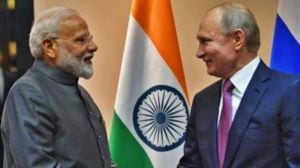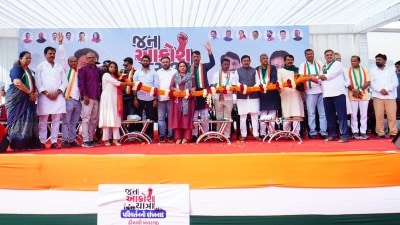Anwaar-ul-Haq Kakar, 53, served as the longest-serving caretaker PM of Pakistan between 14 August 2023 and 4 March 2024. Before taking on the role of caretaker PM, Kakar had resigned from the upper house of parliament.
Subsequently, he publicly declared his resignation from both the Senate and the Balochistan Awami Party (BAP), a political party he established in 2018. In an interview, he spoke to The Indian Express on India-Pakistan ties, SCO, Pakistan-China ties, Pakistan’s economic situation among other issues.

Edited excerpts:
What is Pakistan’s focus at the SCO summit?
We attach a lot of importance to this multilateral event. And you know, our assessment is that SCO is the future. It is the future of the region. It would be a very important player in global affairs. And Pakistan is, if it is not the nucleus, but it, at least, is one of the most important players of the SCO and it shows our role in the region. So, within the region, Pakistan, playing an important role at the diplomatic front, hosting all the leadership over here and encouraging public to public interaction. Pakistan is becoming a nucleus of that blend. And it’s quite an exciting moment for us.
Due to Pakistan’s economic difficulties, it has become much more dependent on China. Your take?
I think people who are not comfortable say so. With the strategic Pakistan-China relationship, there is an attempt to describe and create a perception in which Pakistan is being portrayed as a client state which is more into the Chinese orbit… that so-called debt trap, which China is being accused of not just bringing Pakistan into that, but rather the whole of the region, be it Sri Lanka, South America, Latin America… So it’s the war of narrative at a global scale.
My own assessment is that, no, it is not true. We still have a huge portfolio of Western multilateral lenders… our reliance is on our remittances. Our remittances don’t come from China.
One of the issues that you faced as a caretaker PM was holding the elections. There were questions about the fairness of the elections?
Story continues below this ad
Look, in our country, I feel every election has its own specific context, a specific wave… Yes, this election had its own challenges, the questions about the transparency and the rest has been raised by the opposition, by many other players also. But let me remind you that we are a transitional democracy. We are not a settled democracy, and in transitional democracy, be it in Pakistan or in other parts of Asia or east of Europe, it’s a process.
External Affairs Minister S Jaishankar is in Islamabad, and his is the first visit by a (Indian) foreign minister in 9 years. How do you see this?
I do appreciate it’s not a bilateral engagement, it’s a multilateral engagement…I think it’s a moment of confidence, it’s a moment of opportunity, it’s a moment which both sides should explore to the minimum. And what is the minimum? I have been repeatedly saying that at least we should start realising that — is there any need to talk or communicate? … if you do not realise this basic question and don’t address them and have an honest answer for that… the rest of the edifice cannot be built.
India has taken a very hard position on Pakistan because of terror incidents… You think there is any scope for moving the needle now?
Story continues below this ad
I mean, I do understand that Indian position, and it is more an approach more of not talking to somebody rather than engaging in that position. If I take myself as a student of history, can it be perpetual? Can it or it has to have a shelf life? Can India and Pakistan stay without talks for 300 years… I don’t think that is happening, no matter what the India thinks. This is my prediction, that sooner or later, they (Indian and Pakistan) will talk.









